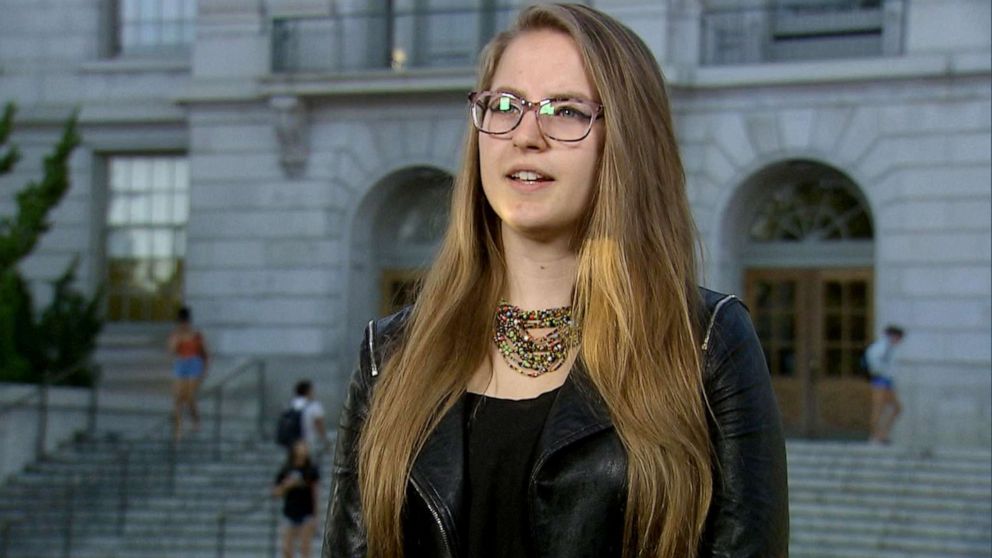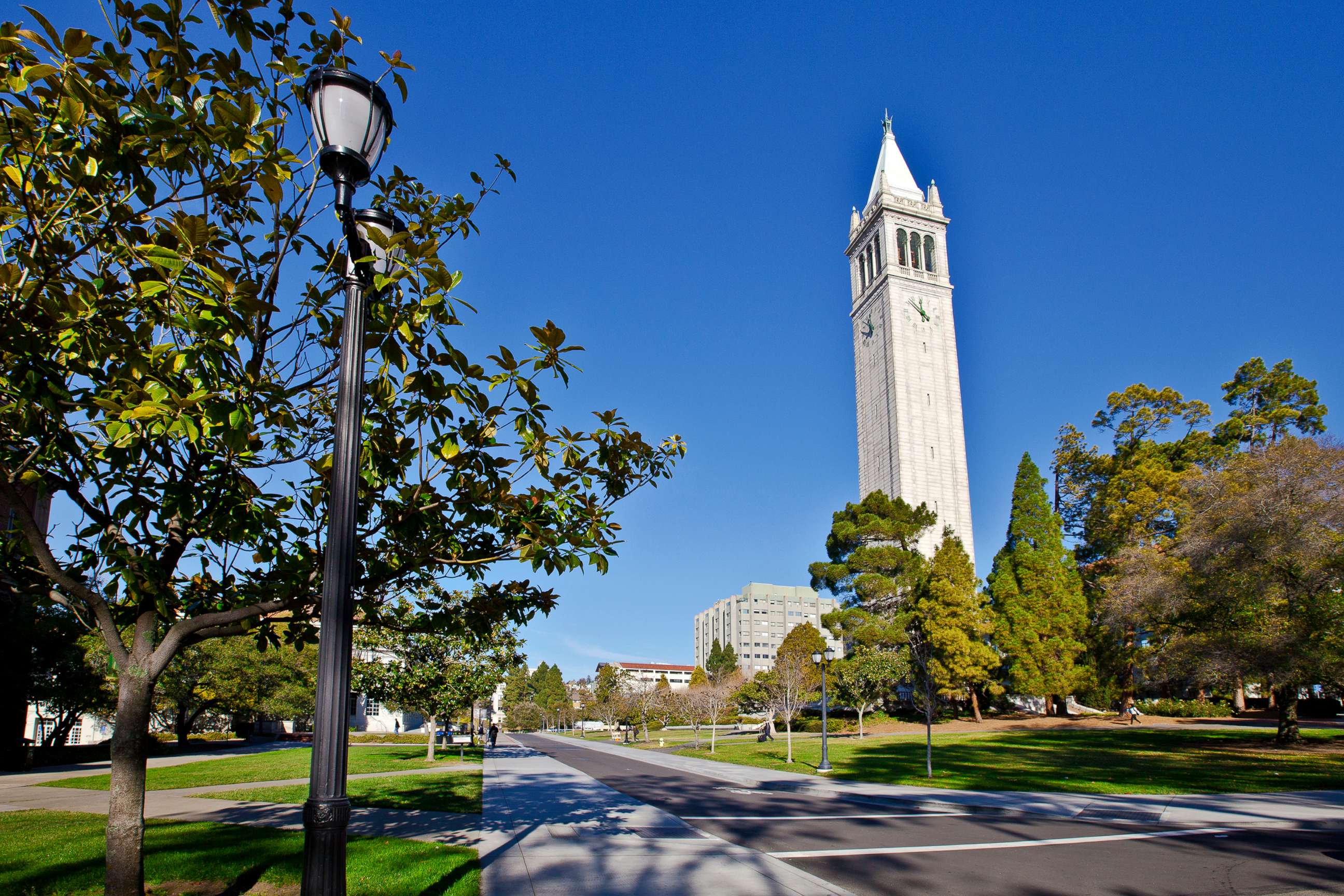Former cheerleader suing UC Berkeley for ignoring concussions speaks out: 'I felt voiceless'
"I felt voiceless and unsupported."
A former cheerleader at the University of California, Berkeley, has filed a lawsuit alleging her coaches repeatedly ignored her concussion symptoms and "bullied" her into performing stunts, causing her to suffer potentially permanent brain damage.
Missy Martin told ABC News she suffered three consecutive concussions within a four-month period while she was a member of UC Berkeley's cheerleading and competitive stunt teams from April 2017 through February 2018. She said she was forced to take a medical leave of absence from school in September 2018 and seek ongoing medical care.
"The symptoms have been prevalent for two years now," Martin said in an interview Tuesday on "Good Morning America."
"Every day I have a headache," she added.
Martin is now suing the university, her former coaches and USA Cheer, the national governing body for competitive cheer. She claims her injuries were not taken seriously and that her complaints were met with "indifference and even disdain."
"I felt voiceless and unsupported," Martin told ABC News. "They weren’t giving me the attention and the resources and the direction for healing properly."
Although UC Berkeley spokesperson Dan Mogulof said he couldn't comment on the allegations due to privacy rights, he told ABC News that the university's athletics department follows a "comprehensive policy on concussion management."
"This policy includes essential elements of concussion education and protocols for management of concussion," Mogulof said in a statement Monday. "Cal’s cheerleading coach maintains safety certification from several national agencies, including with the American Association of Cheerleading Coaches and Administrators, which requires concussion education, and the coach has undergone additional in-person training on health, safety and concussions. Our policy also requires all members of the Cal cheerleading team to have an examination by a medical staff member when they first join the squad; this process includes in-person concussion education from an athletic trainer and a review of the concussion handout produced by the NCAA for student education."
USA Cheer did not immediately respond to ABC News' request for comment.

In the lawsuit filed last week in the Superior Court of California, County of Alameda, the ex-cheerleader said she was kicked in the head while stunting as a base during a team practice in early October 2017. Martin said she began experiencing severe headaches, nausea, sensitivity to light and sound, and other symptoms of a concussion in the following days. When she told the head cheerleading coach she intended to go to the university's health services center for evaluation, the coach allegedly "pressured" Martin to participate at the upcoming game and even instructed her not to go to the doctor, according to the complaint.
Martin said she felt "intimidated and silenced" by the head coach, whom she described as "strict and authoritarian." The contracts that the university and USA Cheer required Martin to sign also mandated her to follow the coaches' instructions, according to the complaint.
Martin said her symptoms persisted so she went to the university's health services center, despite her coach's orders. The doctor confirmed Martin had suffered a concussion and instructed her to rest and gradually return to physical actively only once she's symptom-free. Martin was also referred to the specialty concussion clinic, according to the complaint.
Martin said she relayed the doctor's instructions to the head coach the following day. But the coach allegedly instructed Martin to still attend practices and to partake in an upcoming football game.
In the afternoon before the football game, Martin saw the university's concussion specialist, who instructed her to rest and avoid physical activity until she was symptom-free for 24 hours. But when Martin told him she was being required by the head coach to participate in the game's half-time performance that night despite her continued symptoms, the doctor was "dismissive" and allegedly told Martin it was "up to her," according to the complaint.
Still "intimidated" by her coaches, Martin said she attended the game that night and performed during half-time.
In November 2017, Martin told her coaches she did not think she was medically cleared to cheer. However, a few days later, the head coach included Martin in the line-up to cheer at another football game. Martin attended and cheered in the game that night, and she was kicked in the head again while stunting, according to the complaint.
Martin said she was in "immediate distress," crying and hyperventilating, yet she said the head coach initially instructed her just to sit out the first quarter of the game. About 10 minutes later, the coach allegedly told Martin to walk alone to the university's health services center -- over a mile away -- even though she was "in pain, emotionally distraught and physically exhausted." The university doctor confirmed that Martin had sustained a second concussion, according to the complaint.
Martin said she had multiple appointments with concussion and vision specialists between November 2017 and January 2018. Her symptoms were impacting her vision, which hindered her ability to study or read, according to the complaint.
The head coach had allegedly told Martin that she was expected to, at minimum, attend rallies, practices and games, all of which exposed the concussed cheerleader to bright lights and loud noises. Martin communicated her concerns to the university's athletic department, which then informed the head cheerleading coach that Martin wouldn't be able to attend rallies or games. But the coach allegedly still required Martin to attend practices and, "on more than one occasion," instructed her to physically participate, according to the complaint.

On Jan. 11, 2018, the university's concussion specialist told Martin that she could cheer at events but could not tumble or stunt. The doctor sent a letter with that information to Martin's coaches. Still, the head coach allegedly instructed Martin to stunt during practice, according to the complaint.
On Feb. 2, 2018, the university's concussion specialist cleared Martin to return to all cheerleading activities, even though she was not yet symptom-free, according to the complaint. The next day, Martin was hit in the head again while warming up with her team at a basketball game. She cheered at one more game before being "overcome by her concussion symptoms," then resigned from the cheer and stunt teams on Feb. 19, according to the complaint.
On Sept. 10, 2018, Martin was forced to withdraw from UC Berkeley and take a medical leave of absence due to her "ongoing and unbearable concussion symptoms." The university refunded only half of her tuition, according to the complaint.
"I just couldn’t take the symptoms anymore," Martin told ABC News. "I went home to work on healing."
Martin has been diagnosed with post-concussion syndrome with associated disorder of binocular vision.
"Her vision problems make it difficult for her to use both eyes together and maintain a single image for reading," the lawsuit states. "She endured months of therapy, and continues to experience headaches, nausea, confusion and light sensitivity. She is in constant pain and suffers from depression and anxiety over her inability to return to her normal life."
The lawsuit alleges that the defendants were negligent and violated California's Student Athlete Bill of Rights and unfair competition law. Martin's attorney, Jennie Lee Anderson, said her client is seeking damages and is asking the court to order the university and USA Cheer to implement "reasonable concussion protocols for collegiate cheerleaders."
“While there has been a lot of attention around concussion risks for young men in football, there has not been a corresponding level of concern about head injuries for young women participating in cheerleading programs,” Anderson said in a statement. “The University of California should be leading the charge in concussion prevention, but instead, Ms. Martin’s coaches forced her to cheer when she was still recovering from a brain injury and the university did nothing about it.”
Martin said the university treats its cheerleaders as "half-letes," denying them access to resources and medical care afforded to other student athletes.
"The biggest thing I want is change for cheerleaders," she said. "I want them to be safe. I want people to take them seriously, and I want them to treat them like athletes."
ABC News' Angeline Bernabe, Dominick Proto and Suzanne Yeo contributed to this report.




